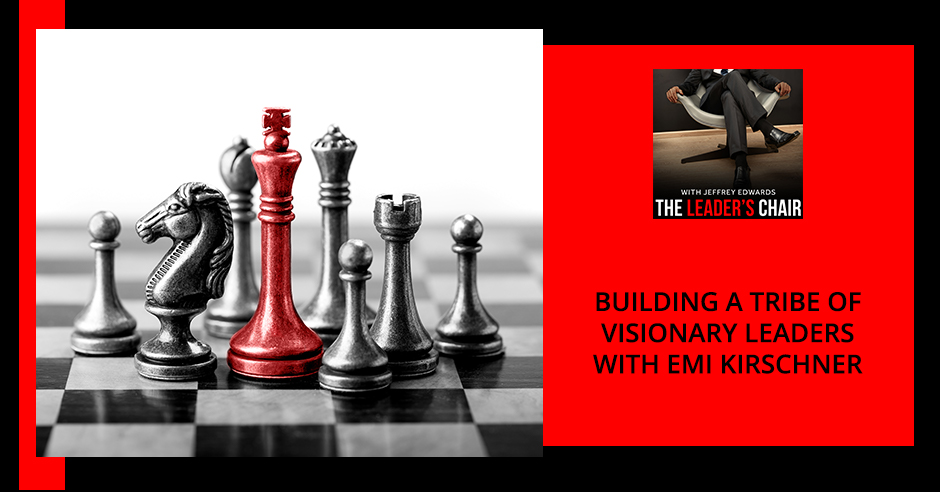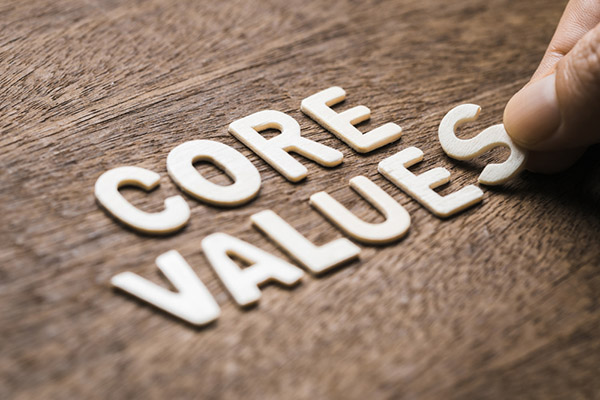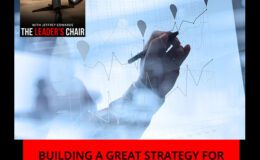
Leadership is about the impact you make, and the people you are able to help with your vision. Business coach Emi Kirschner maximizes this impact by building a tribe of leaders, teaching them how to be like her: a visionary who combines a knack for generating brilliant ideas with a genuine desire to help others.
Emi is an investor, serial entrepreneur, coach and international speaker, helping individuals, organizations, and business people with developing mission-driven teams. She’s also the host of the Tribe of Leaders podcast, and runs an academy for young entrepreneurs, teaching them how to write a business plan and pitch to investors.
In this episode, I learn more about Emi’s journey — whether it’s teaching corporate leaders, seventh graders, or her own daughters.
Check out this episode if you want to learn:
- How to create a team where everyone feels supported
- Why you should never compare yourself to others — even when you feel tempted to!
- How leadership skills can translate into parenting
🎧 Listen to the podcast here:
Building A Tribe Of Visionary Leaders With Emi Kirschner
How did you get to where you are?
My path is probably the windiest path anybody’s ever taken. That being said, I’m an idea generator; high school is when I remember having my first ideas, and not knowing what to do with them. If you combine that with a complete desire to avoid work, then you fall into the role of being an entrepreneur, where you (are) more than a 9-to-5 job.
That being said, my passion (is) helping entrepreneurs, because I love the ripple effects that it creates. I get to help a few people, they help their people, and I feel like I get to touch the lives of thousands, if not millions, even though it’s indirect because of the work I do with helping each entrepreneur make more money, become more profitable — but it’s more than that. The money is great, who doesn’t want more money? (But) it’s about feeling satisfied in helping other people, loving what they’re doing, and showing up in a bigger way.
How do you define leadership?
Part of why I started the Tribal of Leaders podcast and my community is that I wanted people to understand that you don’t have to be the president, Mother Teresa, or some huge figure to be a leader. Everybody is a leader if they choose to be.
For me, it comes down to a number of core values: it’s having integrity, wanting to help others make that impact, owning who you are, and creating communities where everybody can up-level together.
'Learn to fail; don’t fail to learn.' Click To TweetDo you have an example of entrepreneurs you’ve supported who made an impact, even when they thought it impossible?
The two that come to mind are Iman and Afrin Khan, the co–owners of Red Elephant Inc. They do a number of different things with business coaching, but they started with how to sell from stage speaking. It was unbelievable, because they created a family environment for 200 people. It wasn’t about getting up on stage to hock your stuff — it’s (about creating) connection and trust in the relationship, and authenticity. That’s what makes our program successful.
What are the three foundational skills that all successful leaders need to have?
One is learning that failure is OK. I refer to myself as a ‘democratic dictator’ with my kids, because I was a single mom. I parented differently, and gave my kids a lot of independence early on, and the opportunity to mess up purposefully. (They) got ATM cards as soon as they were old enough to have one, and I let them stay alone earlier than some people, so that I could guide them through (any) mistakes.
Similarly, with any leader, (it’s about) helping (teams) understand how they can come into their independence, so that they can make better decisions.
On social media, we’re seeing how everyone’s doing everything supposedly well. You might feel like you’re falling behind.
You don’t want to measure by anybody else’s pace. They’re not in the same place, even if you’re doing the same thing.
If you’re comparing yourself to other people, and what’s working for them — particularly from the standpoint of whatever is being posted on social media — that’s not an accurate representation. You don’t know what’s going on in their world, what happened to them many years ago that got them here, or even the random occurrences that can either create huge leaps in success, or create instantaneous failure.
When you’re looking at it from a neutral place, it’s (a) learning experience. Get centred with who you are, what you want and your crazy, weird, badass, sparkly self. Do that because your people are going to flock to that, instead of you trying to be like somebody else.
What is another skill that someone just starting their leadership journey would need?
I’m going to point this to my kids. They’ve taught me so much about leadership because when I was first divorced, I knew what I wanted to do and who I was, but I was like, ‘How do I show my kids that they can do anything?’ The only way for me to do that is to show up and be who I am. Also, as a single mom, I had little support. My ex-husband moved a couple of hours away for a new job. I had moved houses and (was) rebuilding friendships and connections.

Tribe Of Leaders: Anybody can be a leader if they choose to. It all comes down to a number of core values.
I’m a neat freak, for the most part — I’ll preface the story with that. The kids were boys, and they had Legos all over the place, and video games. It was a weekend and I’m like, ‘This needs to get cleaned up.’ The way I approached it was, ‘If you want to go do something fun on the weekend, we got to clean up altogether. I’m not doing it all, or if you want me to do it all, then you can sit here and we’ll go do fun stuff (while you stay home).’
That created a flow where we have each other’s backs all the time. Here they are at 19 and 21, (and) they’re both living with me temporarily due to the COVID situation. There’s no conversation about simple things — who’s making dinner, who’s doing the dishes, taking the dogs out. We all take turns, and it works.
When you create open conversations, you’re in there with your team members, creating a fluid movement where everybody gets what they need.
You’re creating a common experience where everyone shares in its development, and in the outcome as well.
We’ve had dinner with some of my girlfriends, and they automatically pitch in. Nobody has to ask them, and that’s what you want.
How do you see yourself as a role model to other women and girls?
I love getting into the nitty-gritty with people. I get along well with kids in general, but especially teenage kids, because I treat them like people, like: ‘What do you think about A, B, and C?’ I’ll use their language or mirror some of that. For other moms, I’m like, ‘I did this, and who knows if it’ll work for you?’
'The more money you make, the more good you can do and the more impact you can make.' Click To TweetThere’s no pressure, I’m sharing ideas that worked for me. There’s no judgment around whether or not you take my idea. I’m also not pushing, it’s more of the conversation of, ‘If it works for you, this is what I did with my kids.’ My kids had a ton of independence. They were not given a lot of rules, but I had a hard line, and they knew never to cross the line.
I’m feeling that as you share it.
I like to do things that are fun, to share ideas and connect with people. The curiosity part is, how can I be getting (onto) this person’s level, understand them in a way where I can offer them something of value?
There’s a whole dynamic around being a woman entrepreneur. What do you see your role as being in that space?
Particularly with more creative entrepreneurs, women are like, ‘I don’t deserve to earn this much — I want to earn enough for Susie to go to college, for us to take a vacation.’ They’re limiting themselves, (saying) ‘I don’t know how to do bookkeeping, I don’t understand financial projections and it’s too hard.’ I get it because, in fifth grade, Mr. Williams was telling me repeatedly that I couldn’t do the math, and that played out for a long time until I had to do five-year financial projections with three investors and I was like, ‘I know how to do algebra as a grown-up.’ It took a conversation with a friend of mine for me to have it sink in.
(One study) showed that women, generally speaking, are better investors than men because we’ll ask for help. We’re less emotional about it, and we think about things longer.
The bottom line is, the more money you make, the better you can do, (and) the more impact you can make. Whatever it is (you’re thinking of doing), think bigger, and that allows opportunity for all of those things to come in.
How often do you see people putting limits on themselves?
All the time, every day. That’s a natural human condition. This particular area is the thing that I feel most passionate about, because once we remove it, (we) can open up huge places for people to grow and experience new things.
You have your podcast, Tribe of Leaders. What does it feel like to be a member of a tribe?
Everybody should have some glitter or sparkles!
There are no requirements. The podcast is about different entrepreneurs, their stories of success and failure, growing their business and how that has impacted their leadership.
In the Facebook community, the Tribe of Leaders is a cool group of mostly creative entrepreneurs. There’s training, there’s support, there’s networking. You’d see my shining face from time to time either (doing Facebook) lives or giving interviews. It’s a place that I wanted to create for people who are starting their leadership journey, to come and fast track their business. I’m sure you’ve had the same experience where you’re like, ‘If I knew to fill in the blank six months ago, I would have saved hours, days, months, or money.’

Tribe Of Leaders: Set up the people that you’re leading to mess up so that they can understand how they can come into their own independent, authentic self and make better decisions.
What would you say is the legacy that you’re building?
Helping these entrepreneurs – it’s creating that ripple effect, having these entrepreneurs become more profitable and see new opportunities in a way that they wouldn’t have otherwise. I’m still focused on my kids, even though they’re essentially grown up. They’re still watching (and) we still work together. What I’m doing has to (have) integrity so that they can either mirror, and/or be like, ‘It doesn’t work for me so I’m going to choose something else.’
Longer-term, one of my goals is to start a foundation here in Philadelphia, to eradicate poverty and improve the education system.
What thoughts come to mind when you look at yourself from 10, 20 years ago?
Coming into my 40s, I had no clue (that) this whole decade (would) be about exploring me and ‘growing into myself’. Looking back, I’m like, ‘I have learned so much.’ I’m excited about that, and I have much more to do. I’m always looking at what’s next for me, what I can create or who I can talk to. I’m in that inquiry like, ‘There’s something else that’s big that I’m supposed to be doing. What does that look like?’
I’m going to have to let you know when I have the answer! I’m (also) going to share my favourite quote, which is from Dalai Lama: ‘The point of life is happiness.’ It’s simple, but we lose touch with that.
📌 Important Links:
Love the show? Subscribe, rate, review, and share!
Join The Leader’s Chair Community today on Facebook and Twitter.





